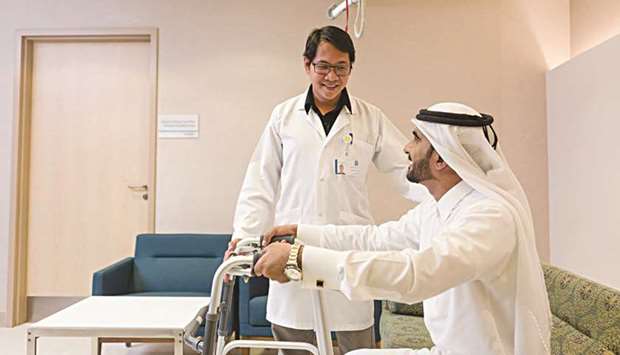A
Simulated Living Suite opened at Qatar Rehabilitation Institute (QRI)
last year is helping patients re-learn the skills needed to regain their
independence and reintegrate into the community.
The suite, which is
also called an Activities of Daily Living room, is a home-like
environment with an accessible bedroom and attached bathroom. It has a
living room with a television, an accessible kitchen, and specially
adapted equipment. A washing machine, accessible doors and windows,
electric switches, plug points, a washing basin with taps, and adapted
switches are also part of the room.
Since the suite opened, a number
of patients with disabilities have been successfully rehabilitated and
are now confidently living independently within their own homes.
Patients who develop a disability after a stroke, spinal cord injury,
head injury, Guliiane Barre syndrome (a disorder in which the body’s
immune system attacks part of the peripheral nervous system), and
multiple trauma-related injuries can relearn daily tasks with activities
organised in the suite.
The self-care retraining suite’s
activities are part of Hamad Medical Corporation’s cutting-edge
occupational therapy treatments that allow patients with disabilities to
practice self-care activities under the supervision of an Occupational
Therapist.
Sultan al-Abdulla, chief, Occupational Therapy at the QRI
said: “An Occupational Therapist helps patients develop and/or regain
the skills they need to return to independent living. The team works
with patients to help them carry out the tasks they need to do at home,
at work, and in the community.”
He added that at the Simulated
Living Suite, Occupational Therapists help patients learn how to use the
accessible kitchen, bedroom, and living room by enabling them to
practice carrying out different tasks such as cooking, by using
equipment adapted to their needs. “We advise patients and their families
on the importance of home modifications by actually showing them how it
should look and allowing them to practice carrying out tasks in the
adapted areas,” said al-Abdulla.
Al-Abdulla hinted that there are
plans to expand the suite’s services by introducing assistive
technology. “Electronic aids to daily living (EADLs) enable people with
disabilities to have more control of their environment. When a person
lacks mobility, motor or cognitive skills that prevent them from
performing even the simplest tasks, EADLs can provide them with some
basic control over their daily life. Individuals can control even the
smallest amount of movement using, but not limited to, various types of
adapted switches. This is being planned for the future,” he added.

The Simulated Living Suite helps patients with disabilities regain the skills for independent daily living.
